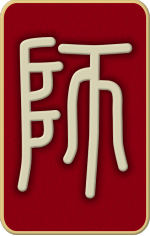
师 Shī Throng (Multitude) [hexagram 7]


Earth over Water
 Earth element
Earth element
Lunar month: 4 ; Host (controlling) line : 2
The Decision
With perseverance, uprightness and mature leadership all will go well.
A throng. Persist in good behavior while holding to the common purpose. Strength earns the proper response but there are inherent dangers. The people will accept suffering through good leadership and all will be well. How can this be in error?
师: 贞, 丈人, 吉无咎. Shī: zhēn, zhàng rén, jí wú jiù.
彖传: 师, 众也, 贞正也, 能以众正, 可以王矣. 刚中而应, 行险而顺, 以此毒天下, 而民从之, 吉又何咎矣. Tuàn zhuàn: Shī, zhòng yě, zhēn zhēng yě, néng yǐ zhòng zhēng, kě yǐ wáng yǐ. gāng zhōng ér yìng, háng xiǎn ér shùn, yǐ cǐ dú tiān xià, ér mín cóng zhī, jí yòu hé jiù yǐ.
The Image
Water contained under earth – throng. The wise educate and care for the mass of people.
象传: 地中有水, 师; 君子以容民畜众. Xiàng zhuàn: De zhōng yǒu shuǐ, shī; jūn zǐ yǐ róng mín chù zhòng.
Line Change 1
The throng sets out in good order. If undisciplined there will be misfortune.
‘The throng sets out in good order’ – the rules must be obeyed otherwise there will be trouble.
初六: 师出以律, 否臧凶. Chū liù: shī chū yǐ lù:, fǒu zāng xiōng.
象传: 师出以律, 失律凶也. Xiàng zhuàn: Shī chū yǐ lù:, shī lù: xiōng yě.
Line Change 2
Leadership from the center of the throng. All will be well. The leader has decreed three missions.
‘Leadership from the center of the throng. All will be well’ – heaven bestows favor. ‘The leader has decreed three missions’- the leader treasures all the lands.
九二: 在师中吉, 无咎, 王三锡命. Jiǔ èr: zài shī zhōng jí, wú jiù, wáng sān xī mìng.
象传: 在师中吉, 承天宠也. 王三锡命, 怀万邦也. Xiàng zhuàn: Zài shī zhōng jí, chéng tiān chǒng yě. wáng sān xī mìng, huái wàn bāng yě.
Line Change 3
The throng may have poor leadership. Misfortune.
‘The throng may have poor leadership’ – they cannot succeed.
六三: 师或舆尸, 凶. Liù sān: shī huò yú shī, xiōng.
象传: 师或舆尸, 大无功也. Xiàng zhuàn: Shī huò yú shī, dà wú gōng yě.
Line Change 4
The throng is retreating. No blame.
‘The throng is retreating’ – this is the proper course of action.
六四: 师左次, 无咎. Liù sì: shī zuǒ cì, wú jiù.
象传: 左次无咎, 未失常也. Xiàng zhuàn: Zuǒ cì wú jiù, wèi shī cháng yě.
Line Change 5
There are birds in the fields, it is worthwhile capturing them. If the more experienced leads the throng while the raw recruits lie idle, then misfortune will follow however resolute.
‘If the more experienced leads the throng’ – they are directed from the center. ‘The raw recruits lie idle’ – they were given incorrect orders.
六五: 田有禽, 利执言, 无咎. 长子帅师, 弟子舆尸, 贞凶. Liù wǔ: tián yǒu qín, lì zhí yán, wú jiù. Zhǎng zǐ shuài shī, dì zǐ yú shī, zhēn xiōng.
象传: 长子帅师, 以中行也. 弟子舆尸, 使不当也. Xiàng zhuàn: Zhǎng zǐ shuài shī, yǐ zhōng háng yě. Dì zǐ yú shī, shǐ bù dàng yě.
Line Change 6
The great ruler issues rewards, some people are to take command and others to lead families. The people who failed to impress are ignored.
‘The great ruler issues rewards’ – according to merit. ‘The people who failed to impress are ignored’ – as they would throw the country into chaos.
上六: 大君有命, 开国承家, 小人勿用. Shǎng liù: dà jūn yǒu mìng, kāi guó chéng jiā, xiǎo rén wù yòng.
象传: 大君有命, 以正功也. 小人勿用, 必乱邦也. Xiàng zhuàn: Dà jūn yǒu mìng, yǐ zhēng gōng yě. xiǎo rén wù yòng, bì luàn bāng yě.
The full set of 64 English translations is available in our new book 'Book of Changes - Deciphered' ➚.